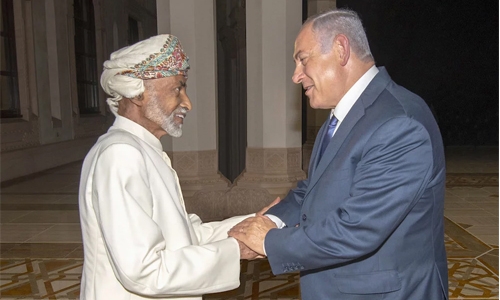Israel’s divide and conquer policy will never achieve peace
I recently attended the International Institute for Strategic Studies Manama Dialogue session, where Omani Foreign Minister Yusuf bin Alawi gave a full-throated defence of establishing relations with Israel. I have to admit to being in two minds. I’ve always been an advocate of dialogue for achieving a just peace for the Palestinians; but does Oman’s unilateral initiative leave us closer or further away from this goal? Benjamin Netanyahu’s unexpected arrival in Muscat represented a major PR coup for Israel’s prime minister.
Netanyahu got his diplomatic breakthrough with an Arab state; he was strengthened at home at a time when multiple corruption cases threaten to drag him down; yet with zero expectation that this breakthrough exacts any benefits for the Palestinians. On the contrary, such a step implicitly legitimises the surrender of Jerusalem — a city that is not just significant for the Palestinians but sacred for the entire Islamic world, along with its distinctive Christian and Arab heritage.
This also risks sending signals to Jared Kushner that the White House’s “deal of the century” can jettison even token concessions to the Palestinians, as if Israel gets everything and the Arab world — which for 70 years has championed the Palestinian cause — will simply look away. Historic agreements signed between Israel and the states of Egypt and Jordan never led to a thawing of relations, bilateral trade, mutual trust or an end to popular hostilities. These agreements instead provided diplomatic cover for an intensification of Israel’s war of attrition against the Palestinian people.
They led the settlement movement to grow from a radical fringe to a tidal wave that today has flooded the entire West Bank, leaving Palestinians clutching to an isolated cluster of micro-cantons with the same potential for coherent nationhood as the scattered Pacific islands of Micronesia. For decades, Israel has been an inward-looking, defensive state, which sought to expand and prosper through the theft of Arab land, one olive grove and one street at a time. If its blinkered leadership abandoned such petty acts of plunder and looked outwards to the wider region, then the potential for the Jewish people to regain their historic commercial role across the Arab world is immense.
Historically, Arabs and Hebrews were all part of the same Semitic peoples. We spoke similar dialects from a common linguistic pool and the question of whom Palestine belonged to wouldn’t have made sense to these ancestors, because so many related tribes and peoples farmed or pastured their herds across these ancient lands. A genuine, just peace would restore such a diverse society, where Muslims, Jews, Christians, Druze, Kurds and others abandon ridiculous pretentions of unique, ethnic superiority or exclusivity and recognise one another’s right to peacefully coexist and thrive.
Perhaps such a comprehensive peace would also offer an opportunity to turn the clock back on recent losses in regional diversity of ancient Christian, Jewish and other minority communities. Such a peace would mean trade, the sharing of technology, educational exchanges and cultural dialogue, not to mention the huge financial dividend when we stop spending a massive proportion of gross domestic product in defending ourselves against each other — thus advancing the security of the entire region. The proposal of building a railway between Israel and the Arabian Gulf is, in principle, a wonderful idea. However, this railway should not be built over the shattered bodies of Palestinians.
The 2002 Arab Peace Initiative, which has been re-endorsed repeatedly by the Arab League — most recently in 2017 — mapped the path toward such a just, comprehensive and warm peace. This proposal offered Israel a normalised and full relationship with the entire Arab world in return for a withdrawal from Arab lands illegally occupied since 1967, as successive UN resolutions have consistently demanded. Meanwhile, secretive bilateral understandings between Netanyahu and Oman’s leadership, enjoying neither popular legitimacy nor the principals of international justice, are a recipe for the continuation of the tense and unjust status quo.
The Arab Peace Initiative made moderate Israelis sit up and listen because it represented the possibility of Israel commencing relations with 20 of its neighbours, including some of the wealthiest and resource-rich nations in the world. On the contrary, it is difficult to imagine Israeli businessmen licking their lips and jumping on the first plane to Muscat, which offers miniscule commercial opportunities and without a single ordinary Omani wanting anything to do with the emissaries of an apartheid state whose political model is based on oppression of fellow Arabs.
Such outreach, which bypasses the Palestinians, may win cheap political points with Washington, but these efforts won’t move the Arab world a millimeter forwards or backwards. Nearly 40 years after Camp David, could you visit Cairo and find a single Egyptian who believes they are at peace with Israel? It is difficult to conceive of any peace with a state led by inflexible hardliners like Netanyahu, Avigdor Lieberman and Naftali Bennett, yet we have a duty to keep trying.
If Israel’s current leaders had been serious about peace, we would long since have seen engagement with the entire Arab nation based on the principles of the Arab Peace Initiative. Instead, Netanyahu tries to neutralise Arab states one by one through a policy of divide and conquer. If Israel aspires to being a true democracy, then it must end the occupation, end the oppression of non-Jews, release the children and freedom fighters, and abandon the daily killings and cumulative theft of Palestinian land.
Peace only comes through give and take, while addressing historic injustices. As soon as Israel decides to seriously pursue peace on this basis, it will find itself not trying to coax individual rulers into secret and unpopular deals, but brokering a genuine peace with the entire Arab nation while offering a comprehensive, compassionate and lasting solution to the Palestinian tragedy.
Related Posts

